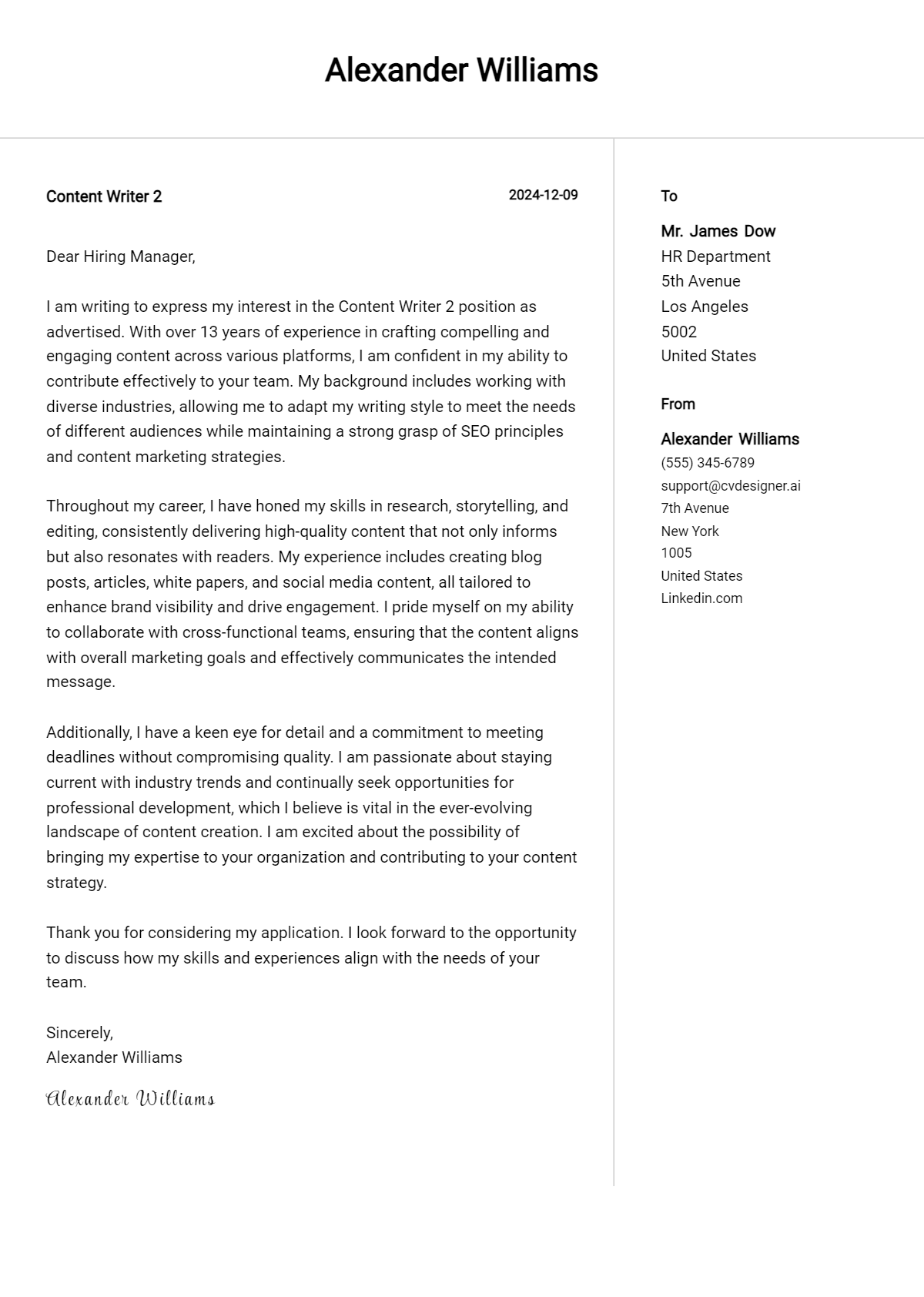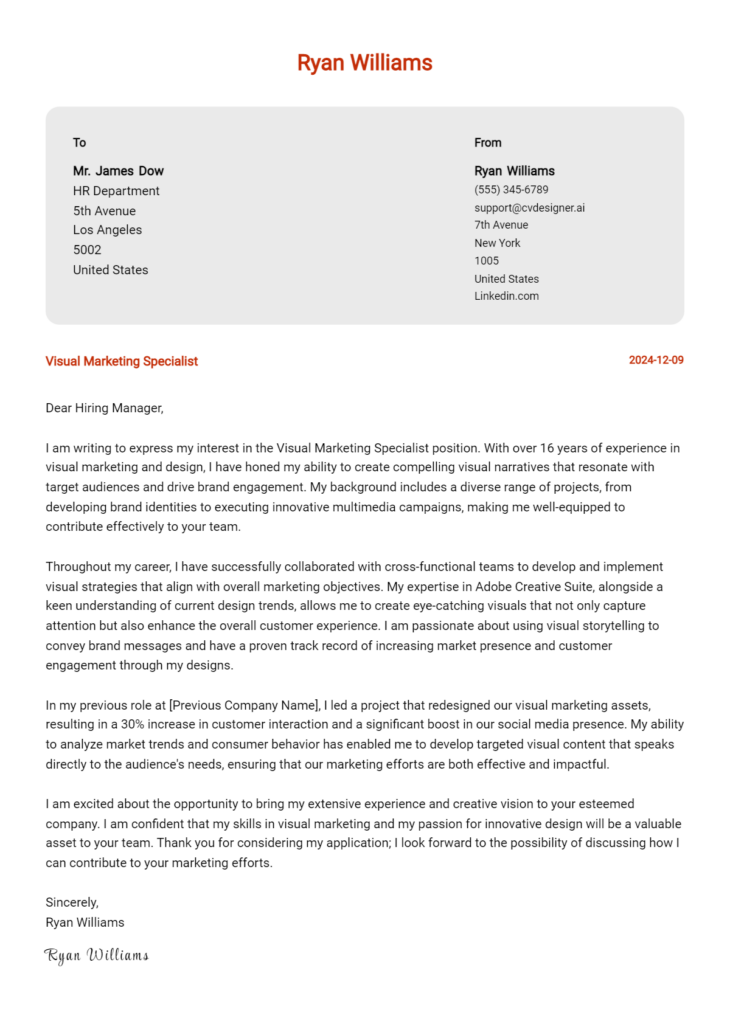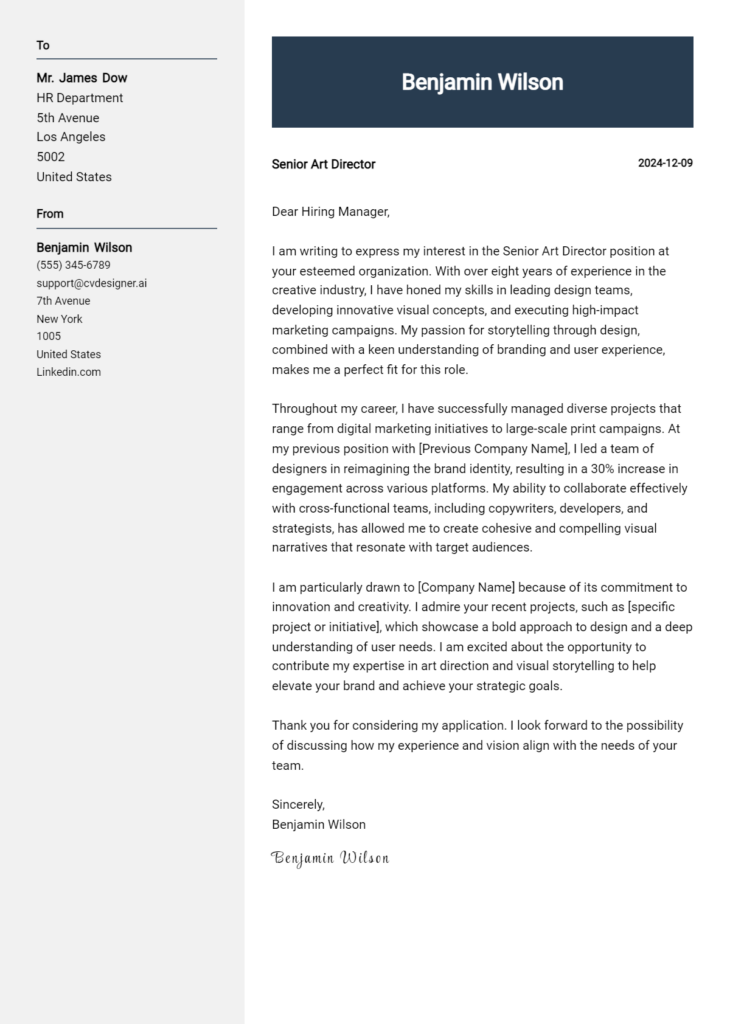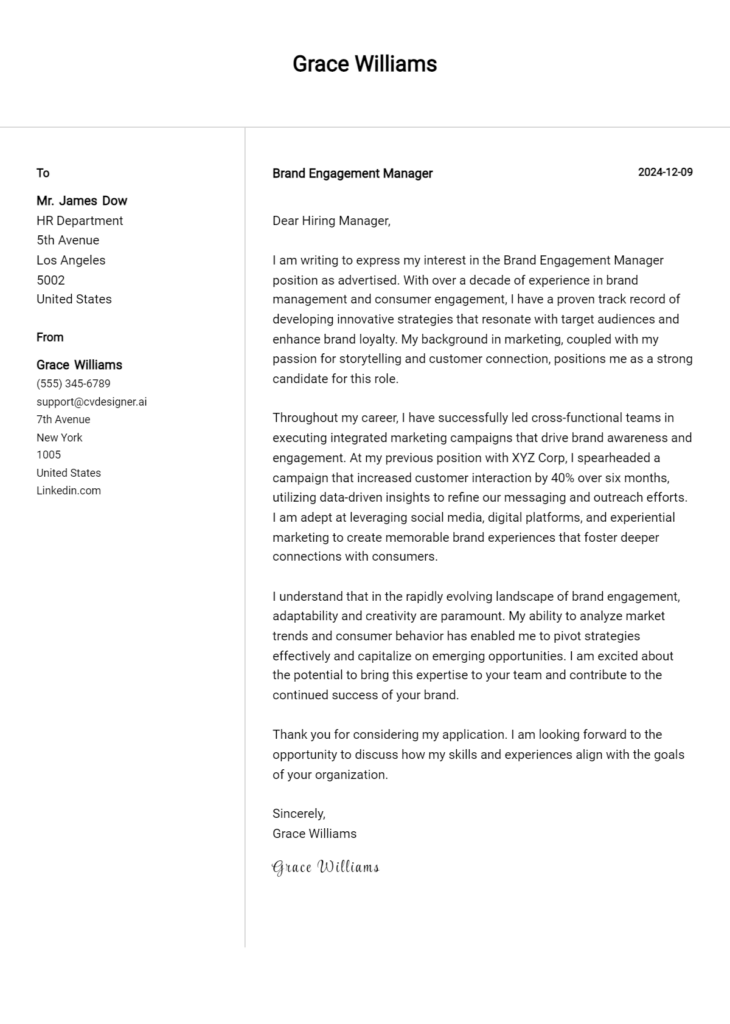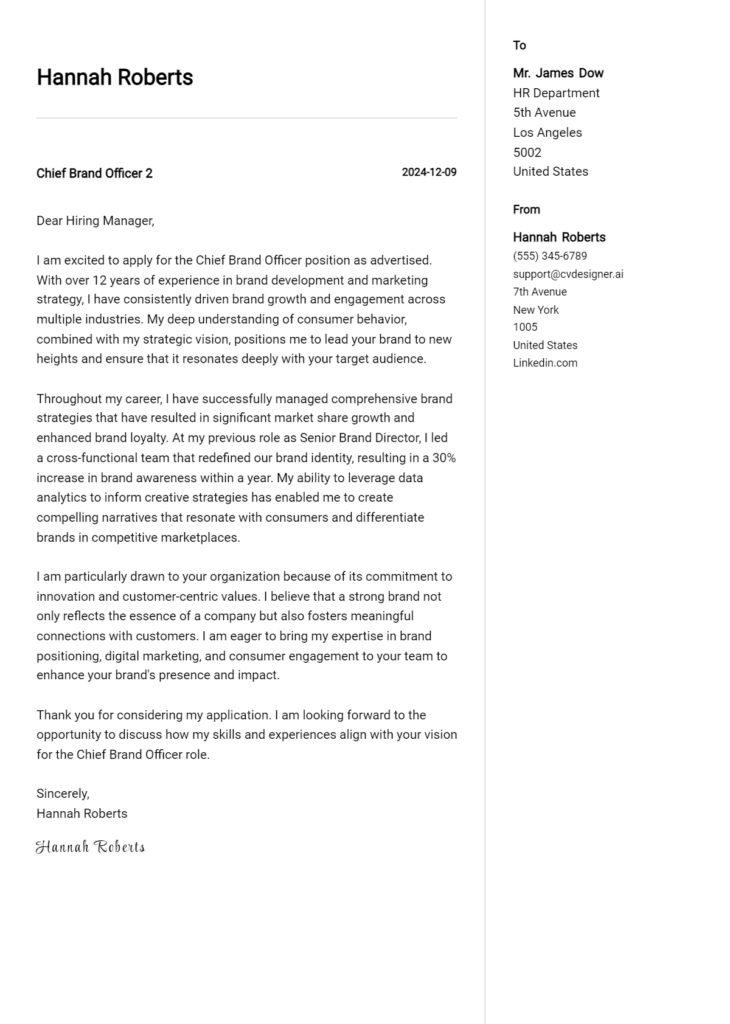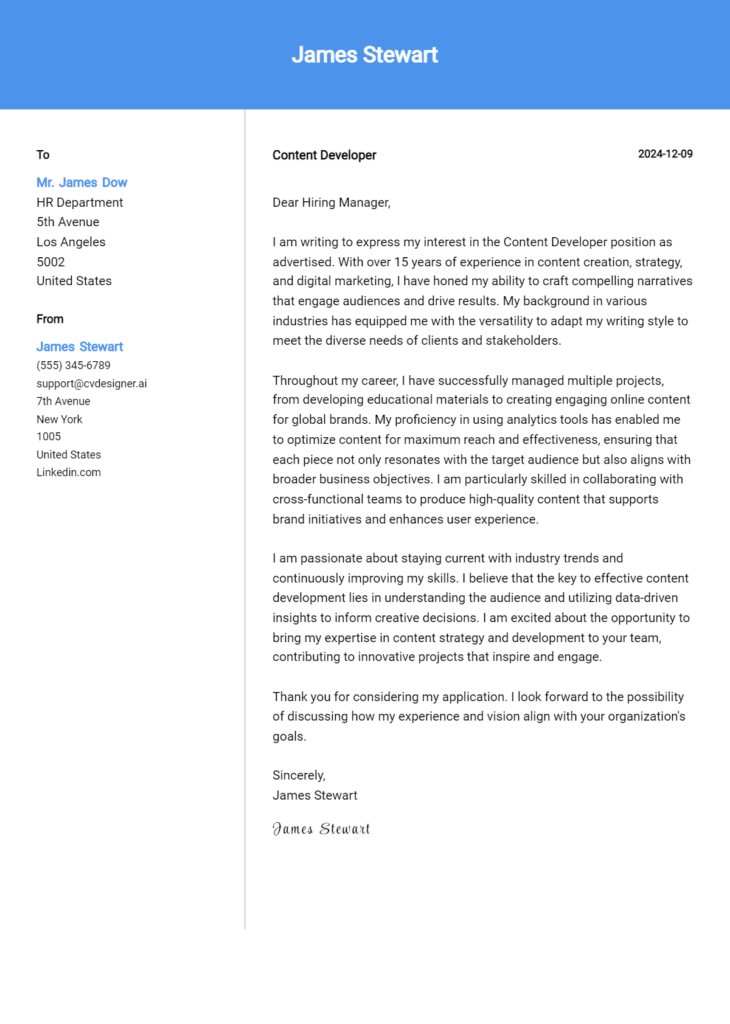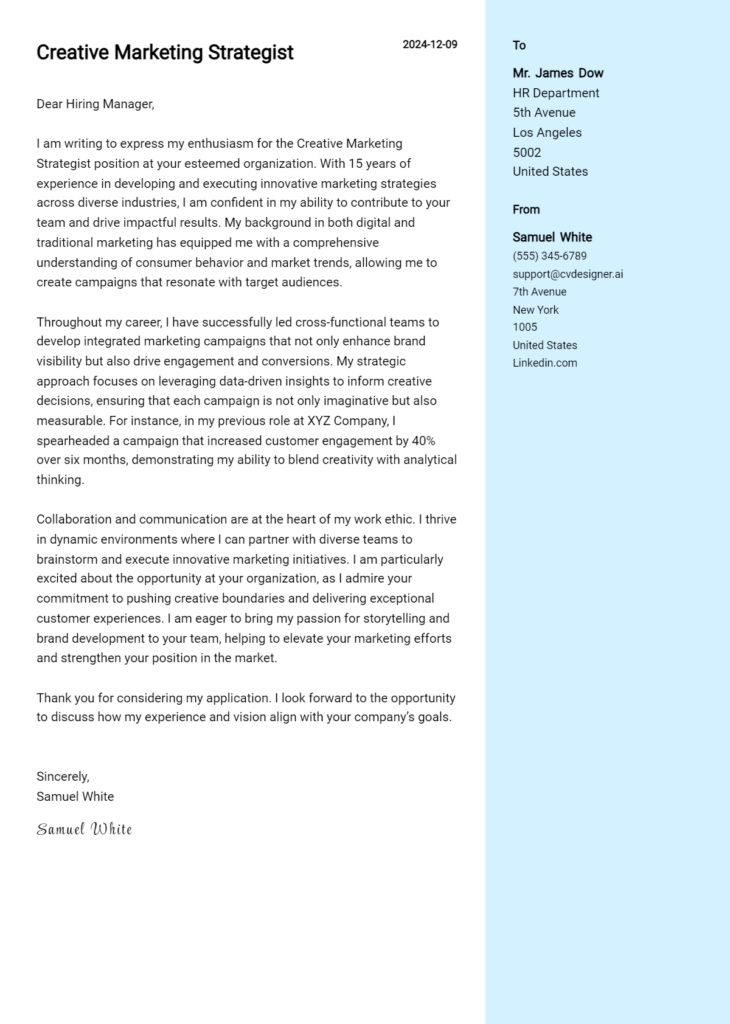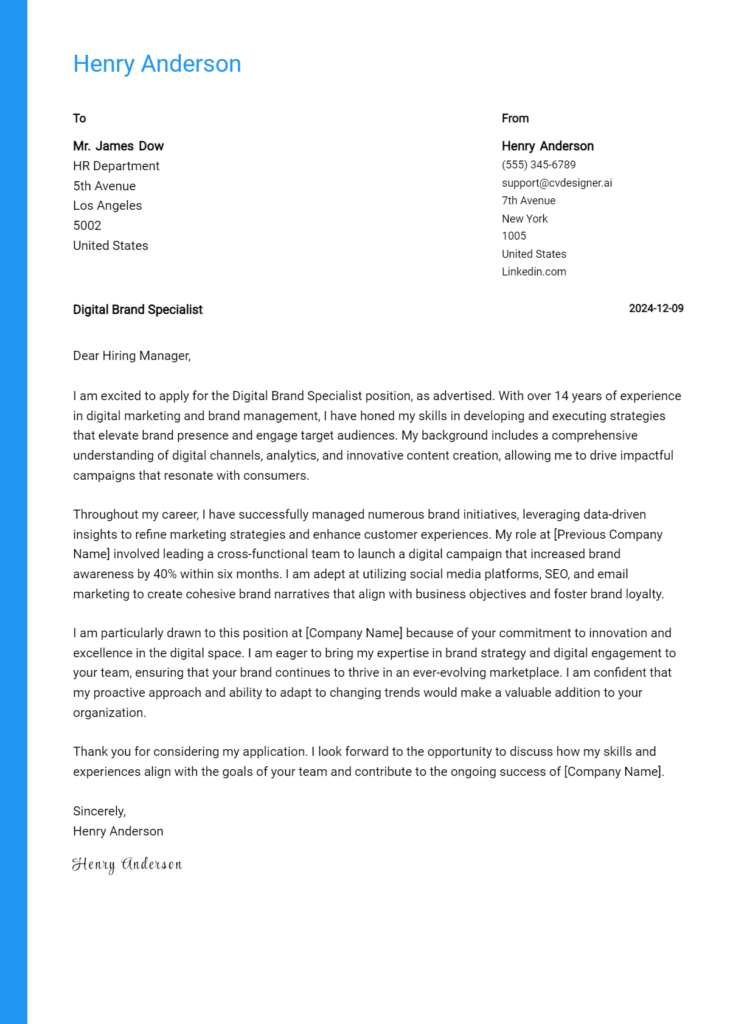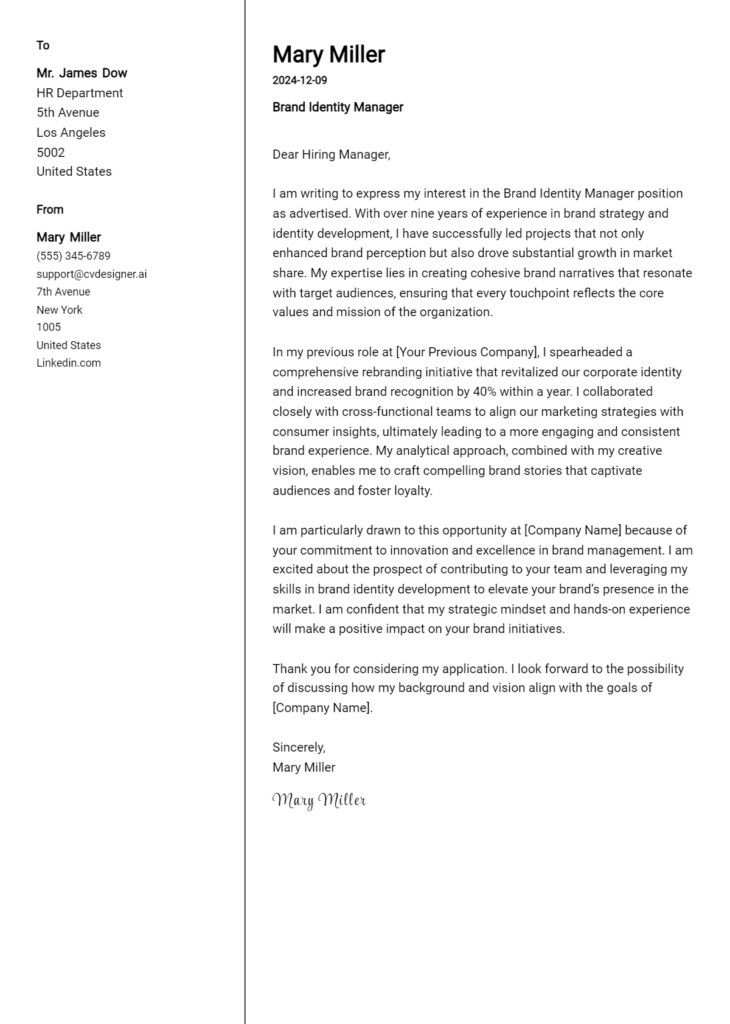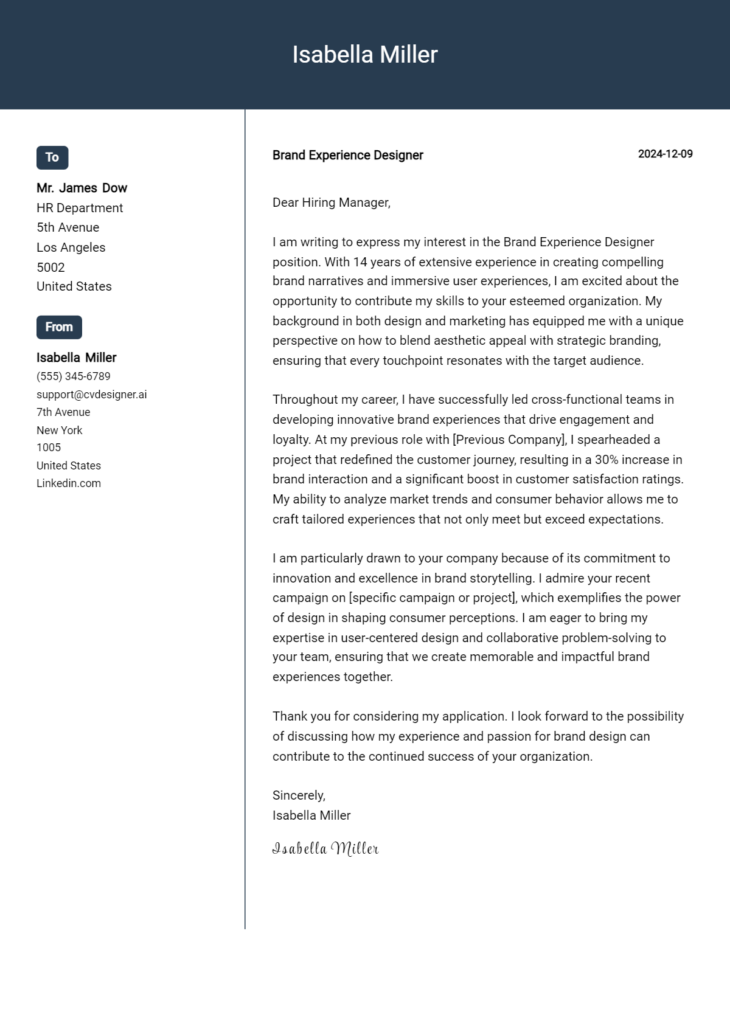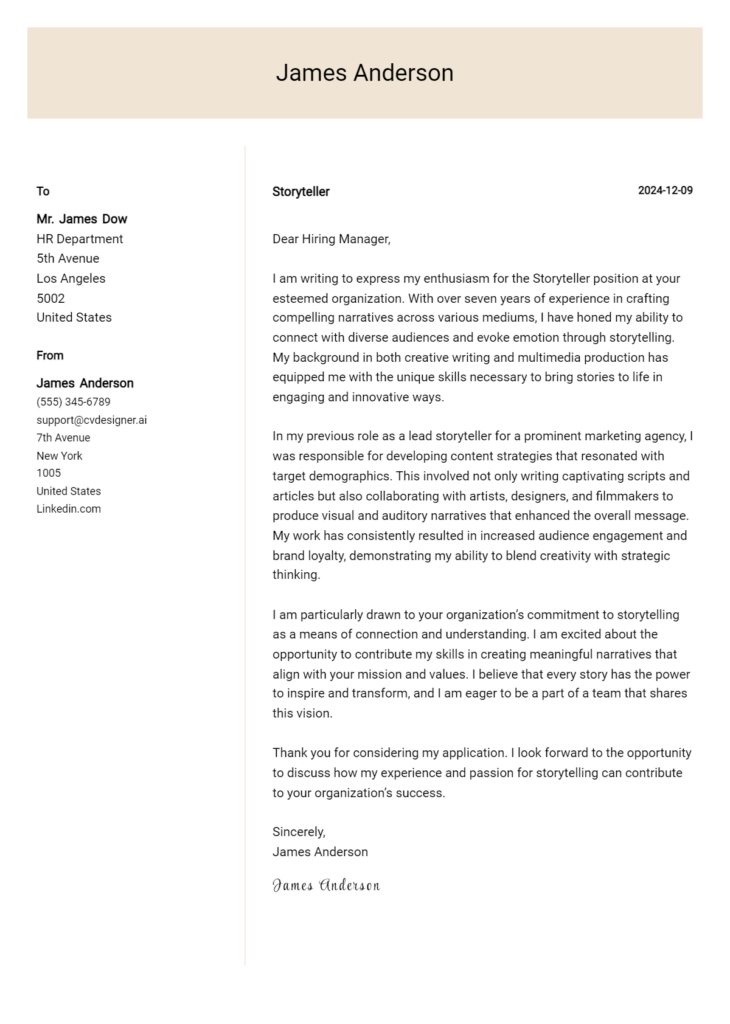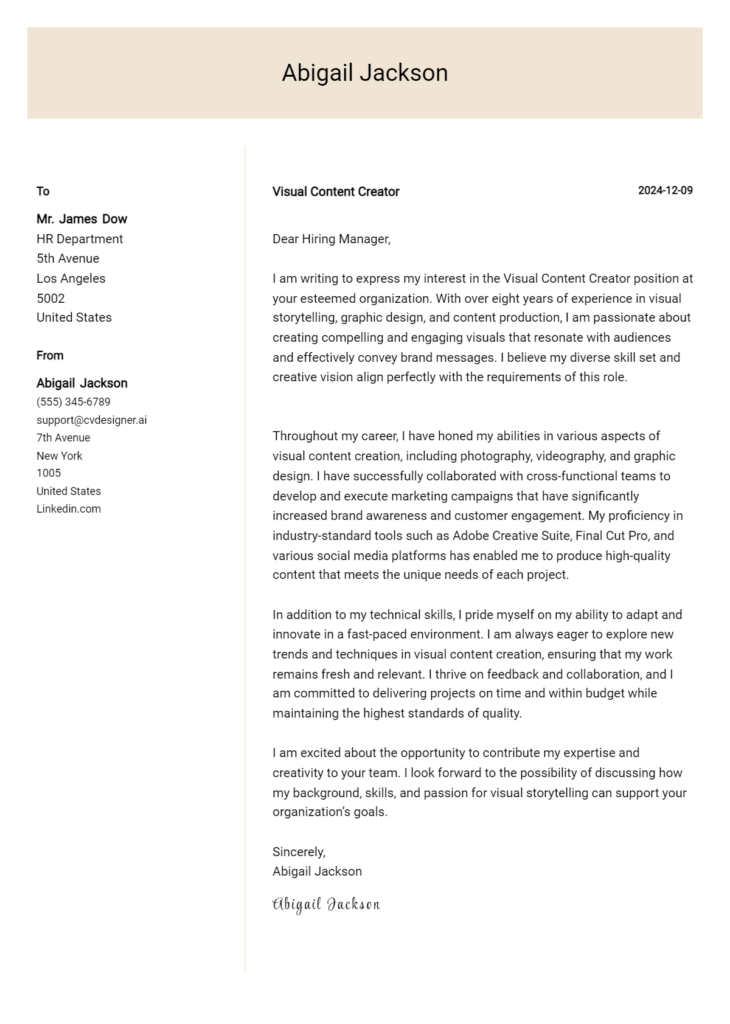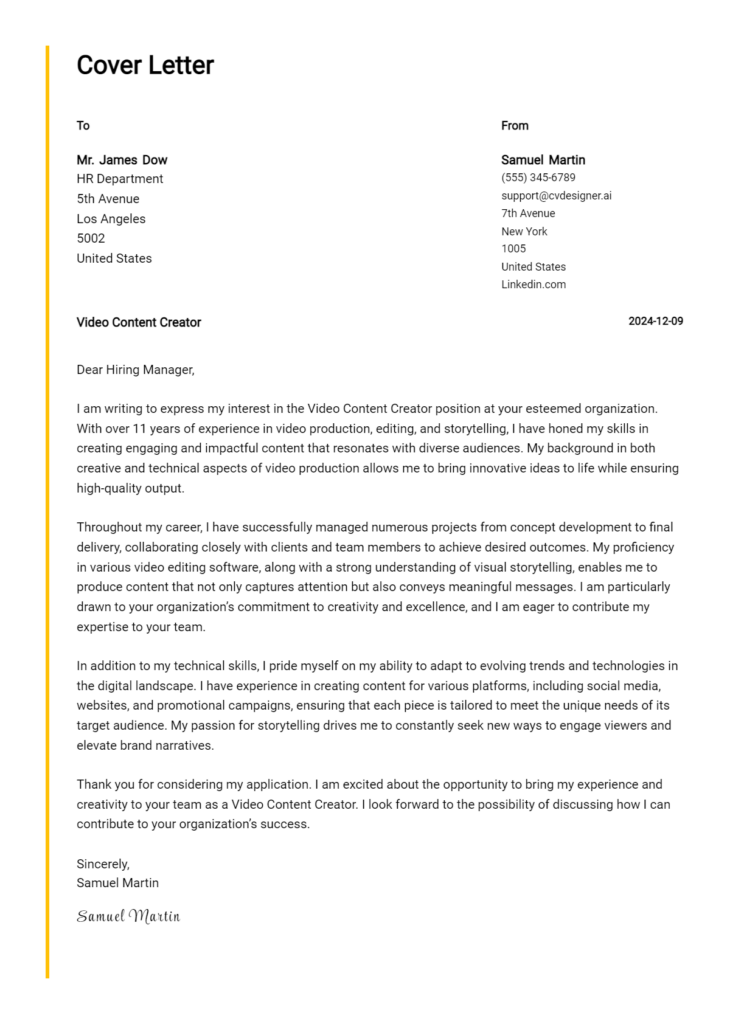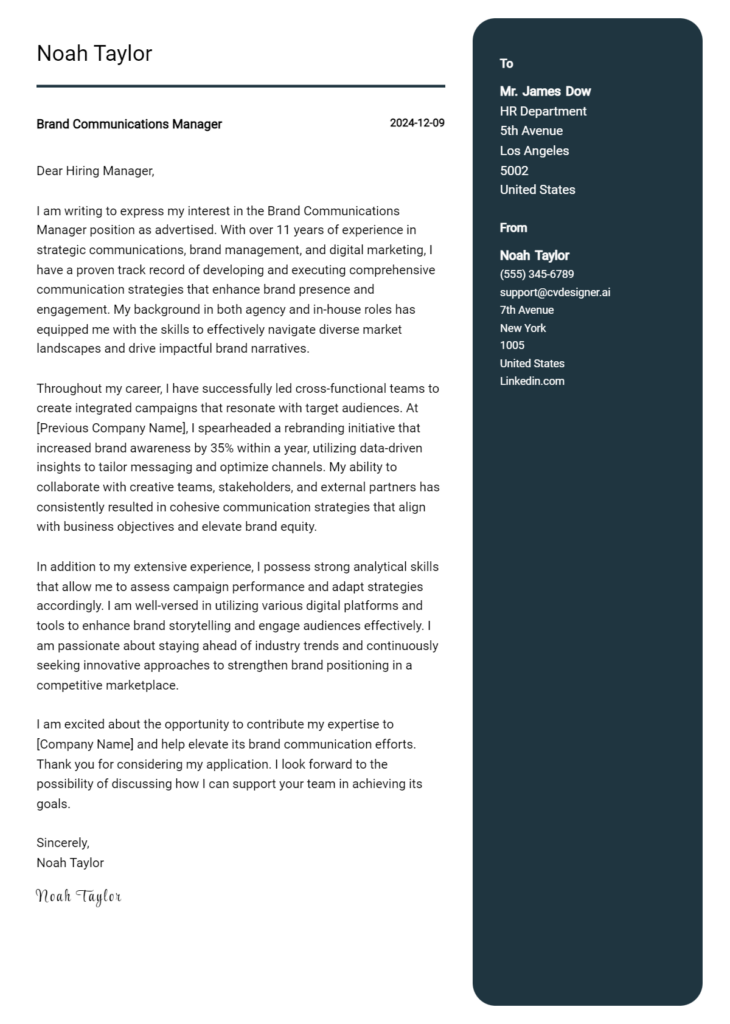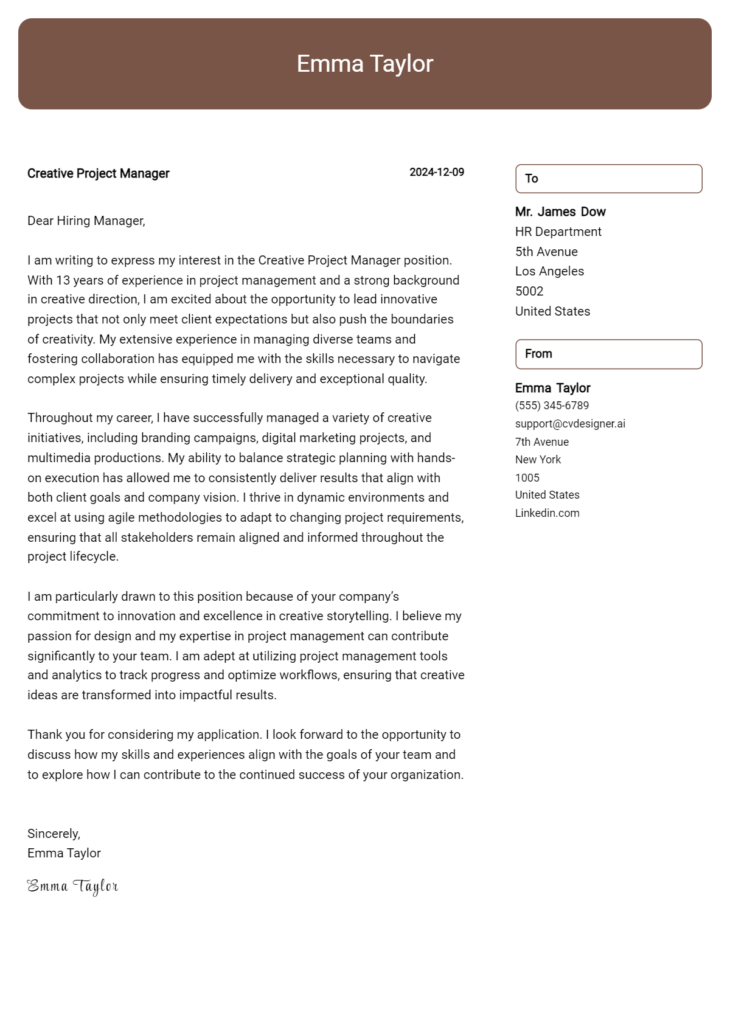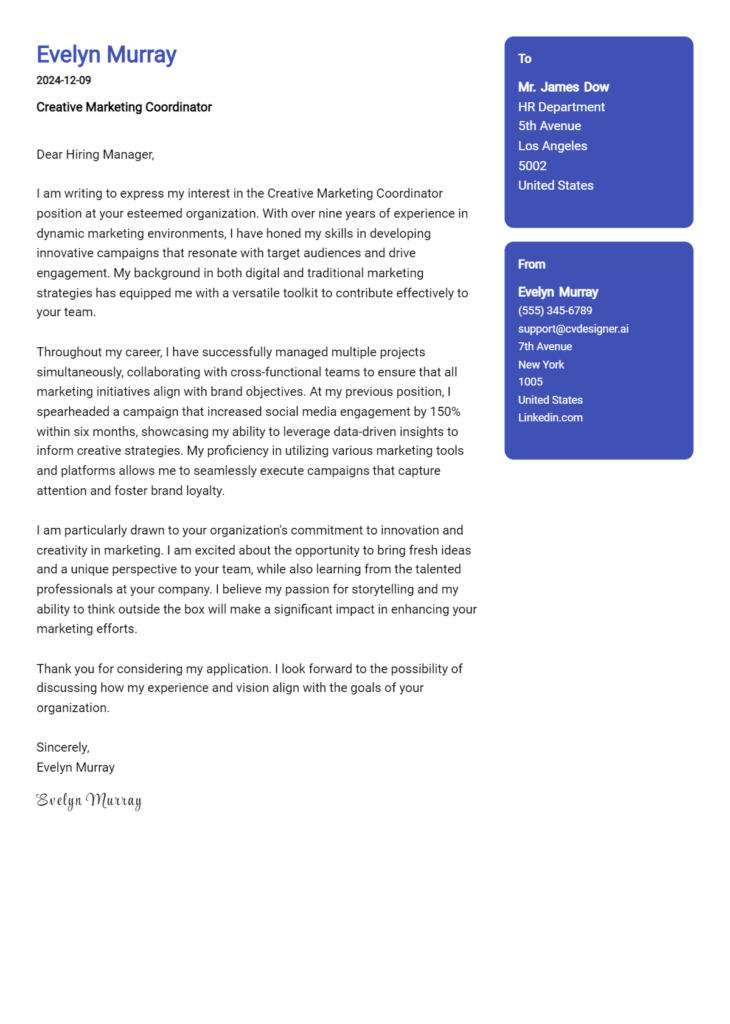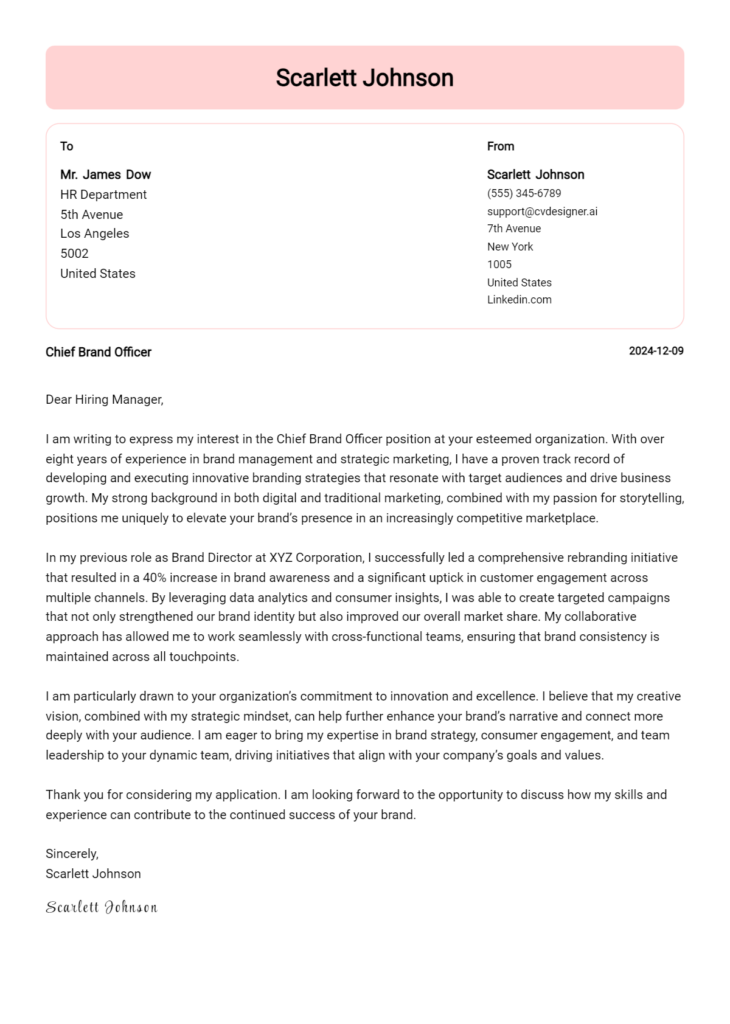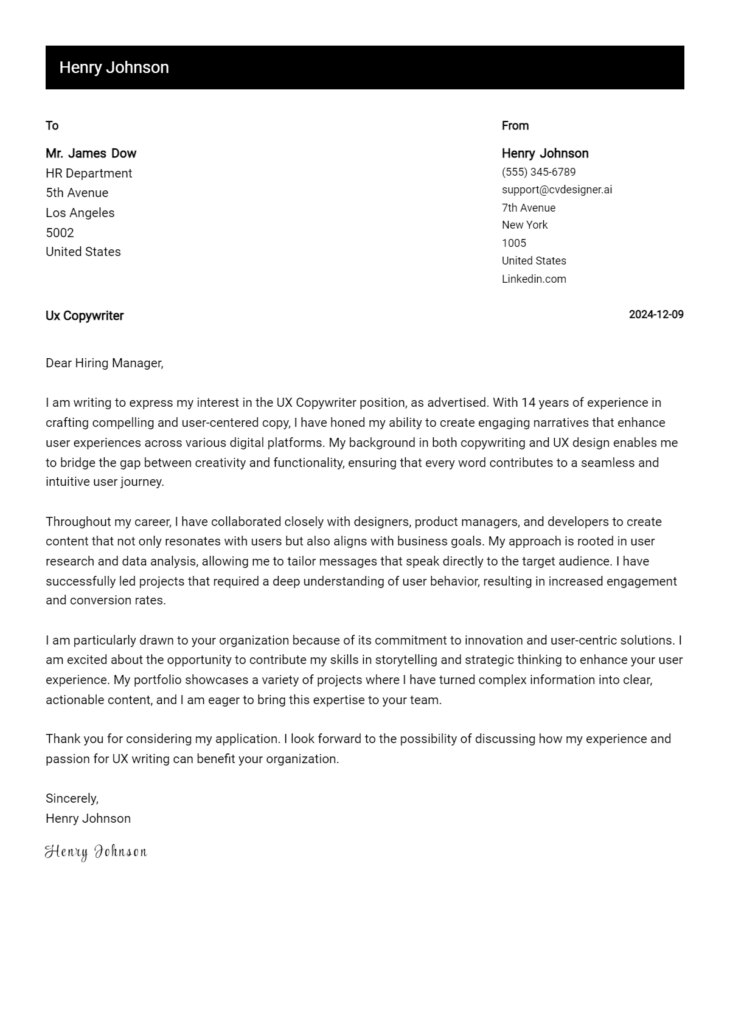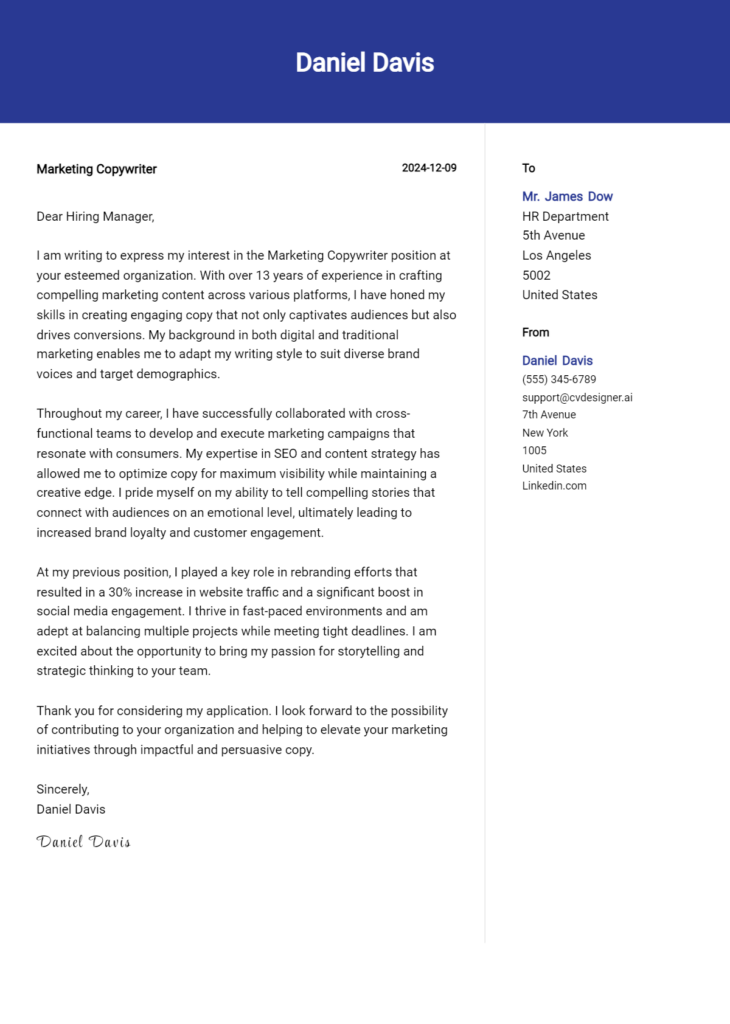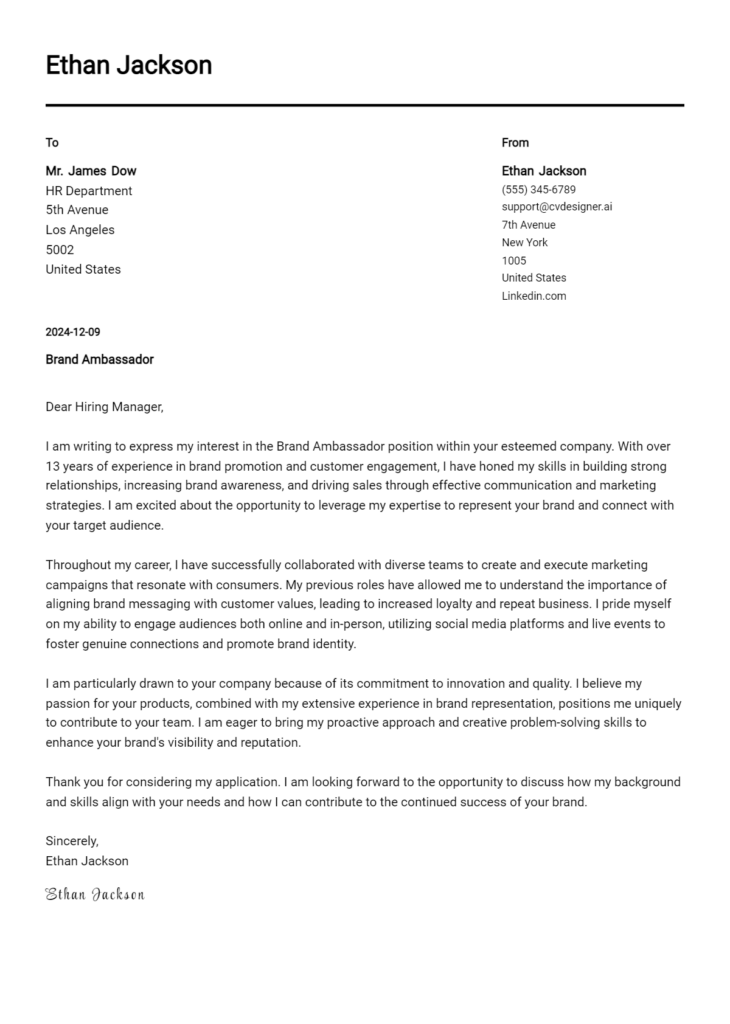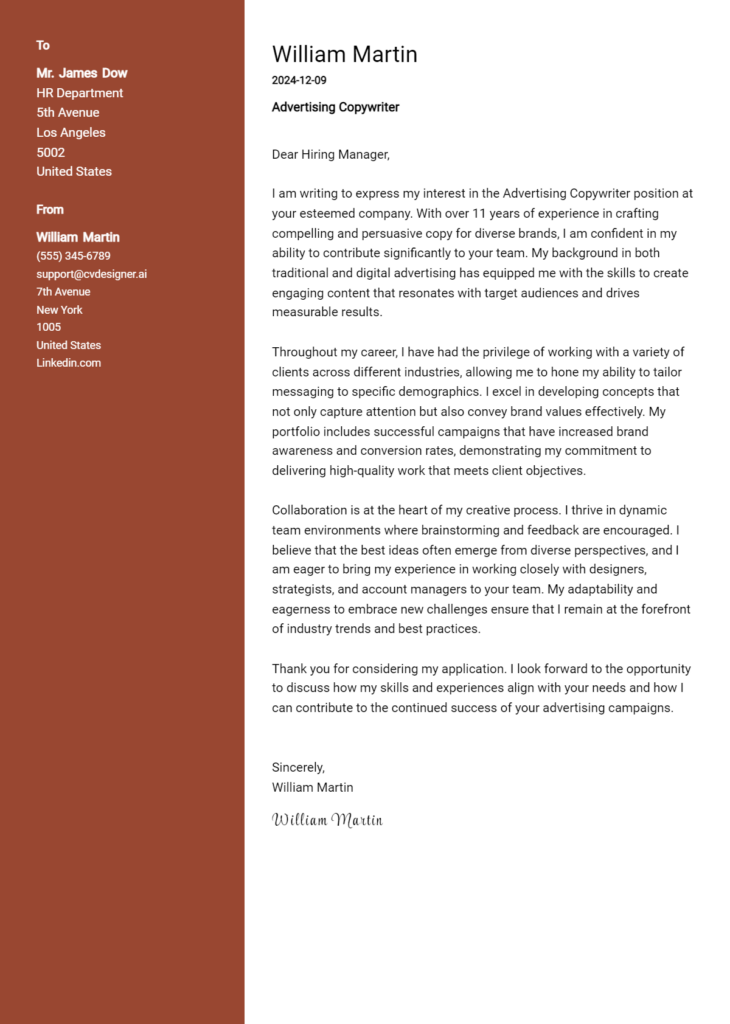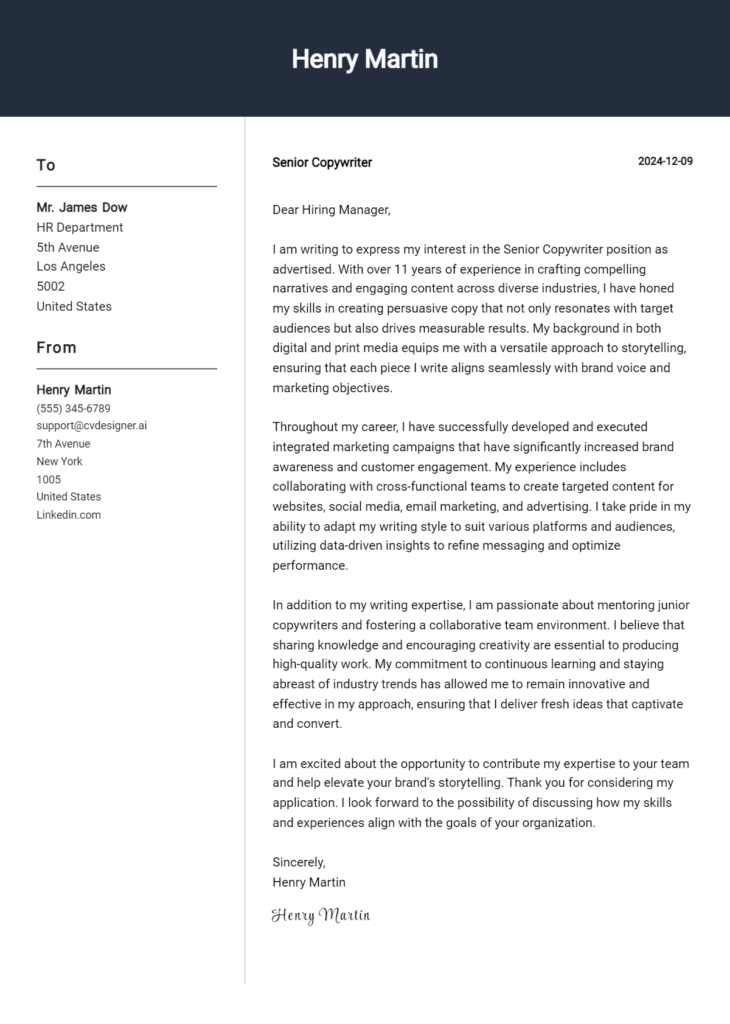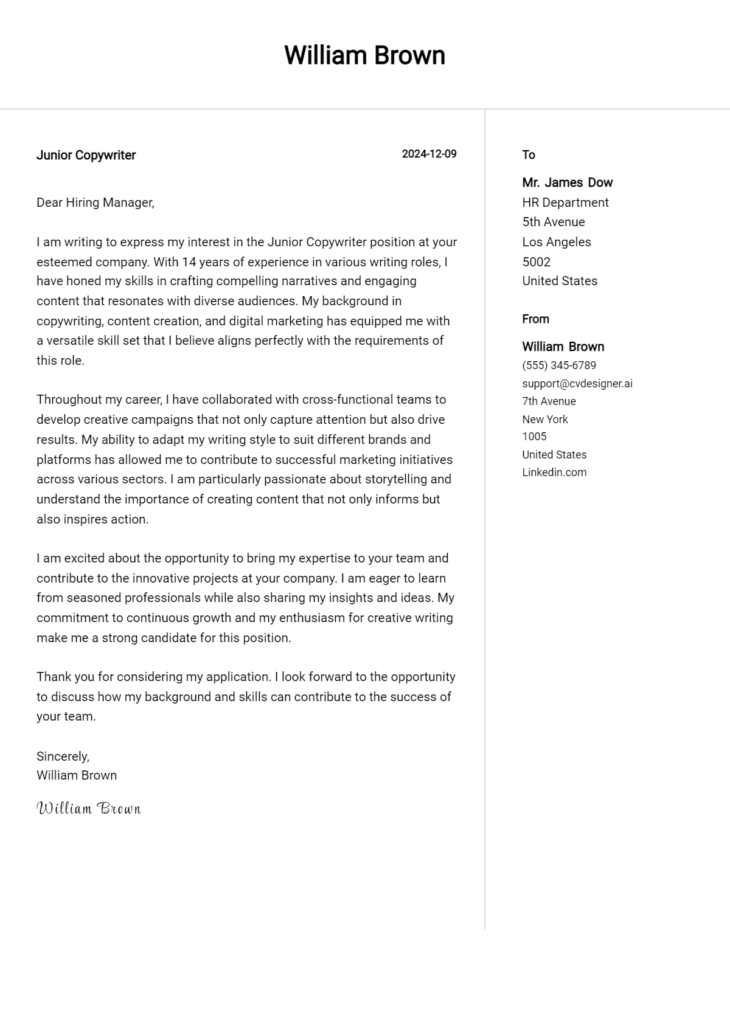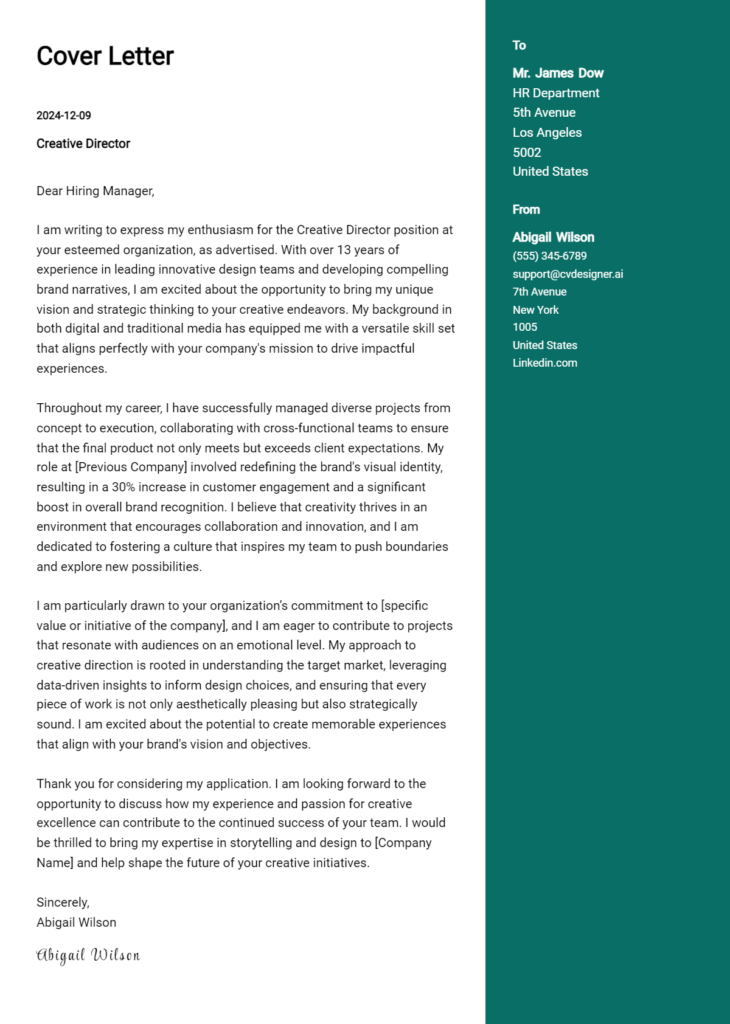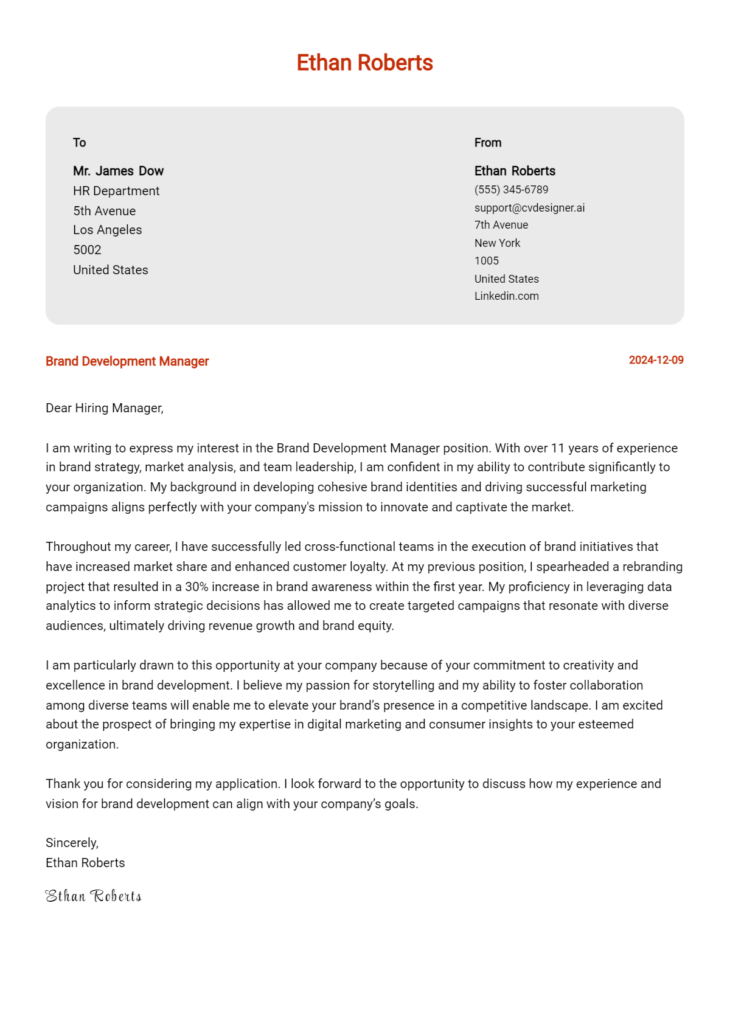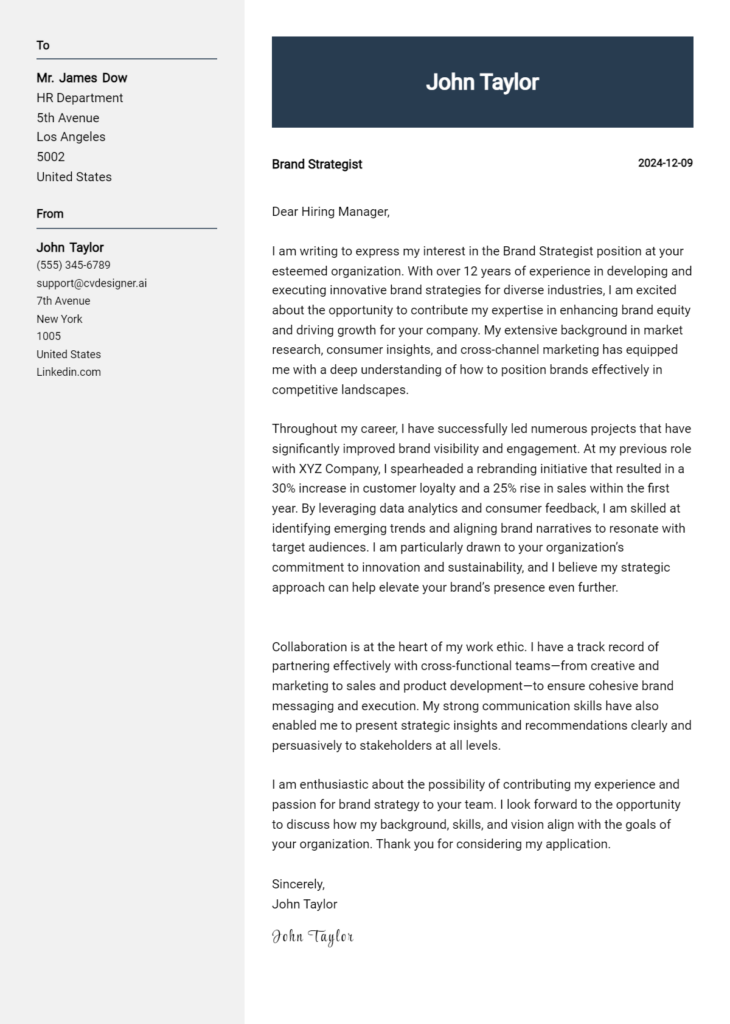Content Writer 2 Cover Letter Examples
Explore additional Content Writer 2 cover letter samples and guides and see what works for your level of experience or role.
How to Format a Content Writer Cover Letter?
A well-structured cover letter is essential for a Content Writer, as it not only showcases your writing skills but also reflects your ability to engage and connect with the audience. The format of your cover letter plays a pivotal role in making a strong first impression on potential employers. Just as you would carefully organize your written content to enhance readability and impact, the layout of your cover letter should guide hiring managers through your qualifications and passion for the role.
In this guide, we’ll explore how to effectively structure your cover letter, providing insights and examples tailored for aspiring Content Writers.
We will focus on the essential components of a professional cover letter, including:
- Cover Letter Header
- Cover Letter Greeting
- Cover Letter Introduction
- Cover Letter Body
- Cover Letter Closing
Each section is crucial in presenting your skills and professionalism. Let’s dive into each part to help your Content Writer cover letter stand out.
Importance of the Cover Letter Header for a Content Writer
The cover letter header is a crucial component of your application as a Content Writer. It sets the tone for the entire document and establishes a professional image from the very start. A well-structured header should include your contact information, the date, and the recipient's details. Clarity and professionalism are essential, as they demonstrate your attention to detail—an important trait for any writer. A strong header ensures that your letter is easily identifiable and adds to the overall impression you make on potential employers.
Strong Example
Jane Doe 123 Writer's Lane Content City, ST 12345 jane.doe@email.com (123) 456-7890 October 1, 2023 John Smith Hiring Manager Creative Writing Inc. 456 Publisher's Blvd Publish Town, ST 67890
Weak Example
jane doe email: jane.doe@email.com Date: 10/1/23 To Whom It May Concern,
The Importance of the Cover Letter Greeting
The greeting of a cover letter is more than just a formality; it sets the tone for the entire document and establishes a first impression with the hiring manager. A well-crafted greeting not only showcases professionalism but also adds a personal touch by addressing the recipient directly. This personalization reflects your genuine interest in the position and the company, making it more likely for your cover letter to stand out. To make your greeting impactful, avoid using generic phrases like "To Whom It May Concern." Instead, invest time in researching the recipient's name and title, which demonstrates your commitment and attention to detail. Below are examples that illustrate strong and weak greetings for a Content Writer cover letter.
Strong Example
Dear Ms. Johnson,
Weak Example
To Whom It May Concern,
The Importance of a Well-Crafted Cover Letter Introduction for a Content Writer
A well-crafted cover letter introduction is crucial for a Content Writer as it serves as the first impression to the hiring manager. This opening paragraph should not only capture the reader's attention but also convey the candidate’s enthusiasm for the position. Furthermore, it should succinctly highlight key skills or relevant achievements that demonstrate the candidate's suitability for the role. A strong introduction sets the tone for the entire cover letter and can make a significant difference in standing out among the competition. Below are examples of both strong and weak cover letter introductions to illustrate this point.
Strong Example
Dear Hiring Manager, As a passionate Content Writer with over five years of experience crafting compelling narratives and engaging blog posts, I was thrilled to discover the opening at [Company Name]. My proven ability to adapt writing styles for diverse audiences, coupled with a track record of increasing web traffic by 40% through targeted content strategies, makes me an ideal candidate for this role. I am eager to bring my creativity and expertise to your team and contribute to [Company Name]'s mission of delivering exceptional content.
Weak Example
To Whom It May Concern, I saw the job posting for a Content Writer and thought I should apply. I have written some articles before and I think I could do well in this position. I am interested in this opportunity and hope you consider my application.
Purpose of the Cover Letter Body for a Content Writer
The body of a cover letter for a Content Writer serves as a critical section where candidates can effectively showcase their unique skills, relevant experiences, and the value they can bring to the prospective employer. This part of the letter should highlight specific projects or accomplishments that demonstrate the candidate's writing capabilities, creativity, and understanding of the target audience. By providing concrete examples, such as successful blog posts, marketing campaigns, or content strategies that led to measurable results, candidates can create a compelling narrative that aligns their expertise with the company’s needs. A well-crafted cover letter body not only captures the attention of hiring managers but also sets the tone for the candidate's overall professionalism and enthusiasm for the role.
Strong Example
Dear Hiring Manager, I am excited to apply for the Content Writer position at XYZ Company. With over three years of experience in crafting engaging blog posts and articles for various industries, I have honed my skills in creating content that resonates with diverse audiences. For instance, my recent project involved developing a 10-part blog series for a health and wellness website, which increased their organic traffic by 40% within three months. Additionally, I collaborated with the marketing team to create a content strategy that boosted our social media engagement by 60% through targeted campaigns. I am eager to bring my expertise in SEO and storytelling to your team to help elevate XYZ Company's content presence.
Weak Example
Dear Sir/Madam, I am writing to apply for the Content Writer job. I have some experience in writing and I think I can do the job well. I wrote a few articles for my college newspaper, and I also enjoy writing blogs in my free time. I believe that I would be a good fit for your company because I like writing and I need a job. Thank you for considering my application.
The Importance of a Strong Cover Letter Closing for a Content Writer
The closing paragraph of a cover letter is crucial for leaving a lasting impression on potential employers. It serves to summarize your qualifications, reiterate your enthusiasm for the position, and encourage the next steps, such as reviewing your resume or scheduling an interview. A well-crafted closing can reinforce your fit for the role and express your eagerness to contribute to the company. In contrast, a weak closing may fail to convey your passion and may leave the hiring manager uncertain about your interest in the position.
Strong Example
Thank you for considering my application. With my extensive experience in content creation and a deep understanding of SEO best practices, I am confident that I would be a valuable asset to your team. I am genuinely excited about the opportunity to contribute to [Company Name] and would love to discuss how my skills align with your needs. I look forward to the possibility of an interview and am happy to provide any additional information needed.
Weak Example
I hope you like my resume. I think I could do okay in this job. Let me know if you want to talk.
Crafting an effective cover letter is a crucial step for candidates aspiring to secure a Content Writer position. A well-written cover letter not only highlights your writing abilities but also showcases your technical skills, problem-solving capabilities, knowledge of the Software Development Life Cycle (SDLC), teamwork experiences, and your passion for continuous learning. By incorporating these elements, you can make a strong impression on potential employers.
Tips for Writing an Effective Cover Letter for a Content Writer Position
Showcase Your Writing Skills: Your cover letter is the perfect opportunity to demonstrate your writing prowess. Use clear, concise language and a professional tone. Tailor your message to the specific job description, showcasing your ability to adapt your writing style to different audiences and formats.
Highlight Technical Skills: Content writing often requires familiarity with various tools and platforms. Mention any relevant software or content management systems you’ve worked with, such as WordPress, SEO tools, or graphic design software. This not only shows your technical proficiency but also your capability to produce high-quality content.
Illustrate Problem-Solving Abilities: Provide examples of how you've successfully navigated challenges in your previous roles. Discuss a specific instance where your writing helped solve a problem or improved a process. This demonstrates your ability to think critically and add value to the team.
Demonstrate SDLC Knowledge: If applicable, relate your experience with the Software Development Life Cycle to content creation. For instance, discuss how your understanding of SDLC phases can enhance communication and collaboration with developers, ensuring that content aligns with technical requirements.
Express Teamwork and Continuous Learning: Content creation is often a collaborative effort. Share experiences that highlight your ability to work well within a team. Additionally, convey your enthusiasm for continuous learning—mention any courses, workshops, or self-directed learning initiatives that have helped you grow as a writer. This can resonate well with employers looking for adaptable team members.
For more guidance, consider exploring various cover letter templates or use a cover letter builder to create a polished and professional cover letter tailored to your unique experience and skills.
Common Mistakes to Avoid in a Content Writer Cover Letter
Crafting an effective cover letter is essential for any content writer aiming to stand out in a competitive job market. Avoiding common pitfalls can significantly enhance your chances of making a great impression. Here are some frequent mistakes and tips on how to steer clear of them:
Generic Greetings: Using "To Whom It May Concern" can make your letter feel impersonal. Instead, research the hiring manager’s name and address them directly.
Lack of Specificity: Failing to tailor your cover letter to the job can show a lack of interest. Highlight specific skills and experiences that match the job description.
Overly Formal Language: While professionalism is key, using overly complicated language can alienate your reader. Keep your tone conversational yet polished.
Neglecting Formatting: A cluttered or unprofessional format can detract from your message. Ensure your cover letter follows a clear structure—consider checking out our cover letter format.
Repetition of the Resume: Your cover letter should complement your resume, not repeat it. Use this opportunity to showcase your personality and explain how your skills can benefit the company.
Ignoring the Call to Action: Failing to express enthusiasm for an interview can be a missed opportunity. End your letter with a strong call to action that invites further discussion.
Typos and Grammatical Errors: Simple mistakes can undermine your professionalism. Always proofread your letter or have someone review it before submission.
By avoiding these common mistakes and focusing on delivering a tailored, engaging message, you can increase your chances of landing that coveted content writing position. For inspiration, consider browsing our cover letter examples to see how others have successfully presented their skills.
Cover Letter FAQs for Content Writer
What should I include in my cover letter as a content writer?
In your cover letter, you should include your relevant writing experience, skills, and accomplishments that pertain to the job you’re applying for. Start with a strong opening that grabs attention—perhaps mentioning a notable project or achievement. Highlight your familiarity with SEO, content strategy, or any specific tools that are relevant to the position. It’s also beneficial to showcase your understanding of the company’s voice and audience. Include a brief example of how your writing can meet their needs or solve a problem. Finally, don’t forget to express enthusiasm for the role and the organization to convey your genuine interest.
How can I demonstrate my writing skills in my cover letter?
To demonstrate your writing skills in your cover letter, focus on clarity, conciseness, and creativity. Use a clear structure with an engaging opening, informative body paragraphs, and a compelling conclusion. Choose your words carefully; avoid jargon and overly complex phrases. Incorporate a brief writing sample or a link to your portfolio to showcase your versatility and style. If possible, mention specific metrics that highlight the effectiveness of your writing, such as increased engagement or readership. Remember, your cover letter is a reflection of your writing ability, so it should be polished and free of errors.
Should I tailor my cover letter for each job application?
Yes, you should definitely tailor your cover letter for each job application. Personalizing your cover letter shows that you’ve researched the company and understand their specific needs and culture. Highlight relevant experiences that align with the job description and mention any connections you have to the company’s projects or values. This not only demonstrates your enthusiasm for the position but also sets you apart from generic applications. Additionally, addressing the hiring manager by name, if possible, adds a personal touch. Tailoring your cover letter increases your chances of making a positive impression.
How long should my cover letter be?
Your cover letter should ideally be one page long, which typically translates to about 250-400 words. The key is to be concise while still providing enough detail to convey your qualifications effectively. Aim for three to four paragraphs: an engaging introduction, a body that highlights your relevant skills and experiences, and a strong conclusion expressing your enthusiasm and willingness to discuss further. Being succinct respects the time of the hiring manager while still allowing you to showcase your writing skills. Avoid rambling or including unrelated information to maintain focus and clarity.
Build your Cover Letter in minutes
Use an AI-powered cover letter builder and have your letter done in 5 minutes. Just select your template and our software will guide you through the process.

